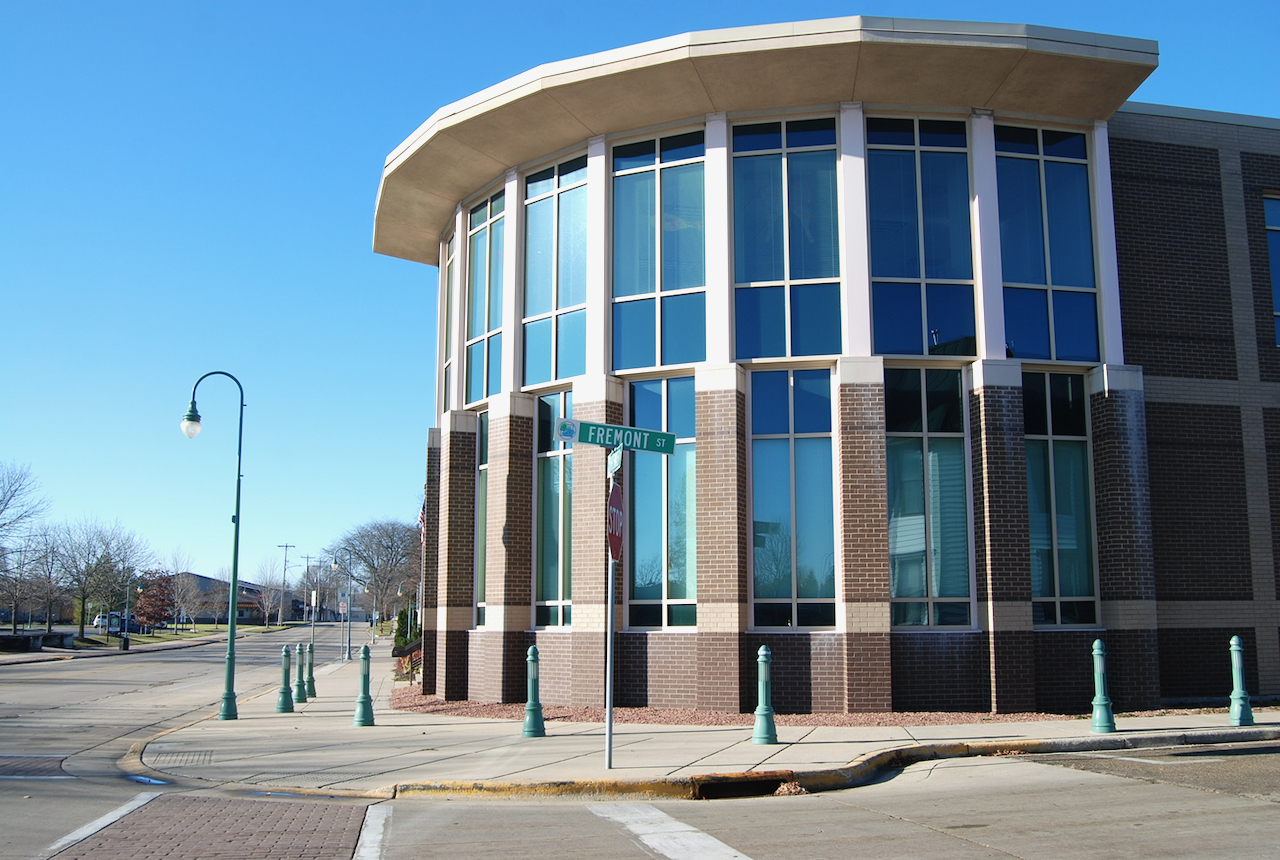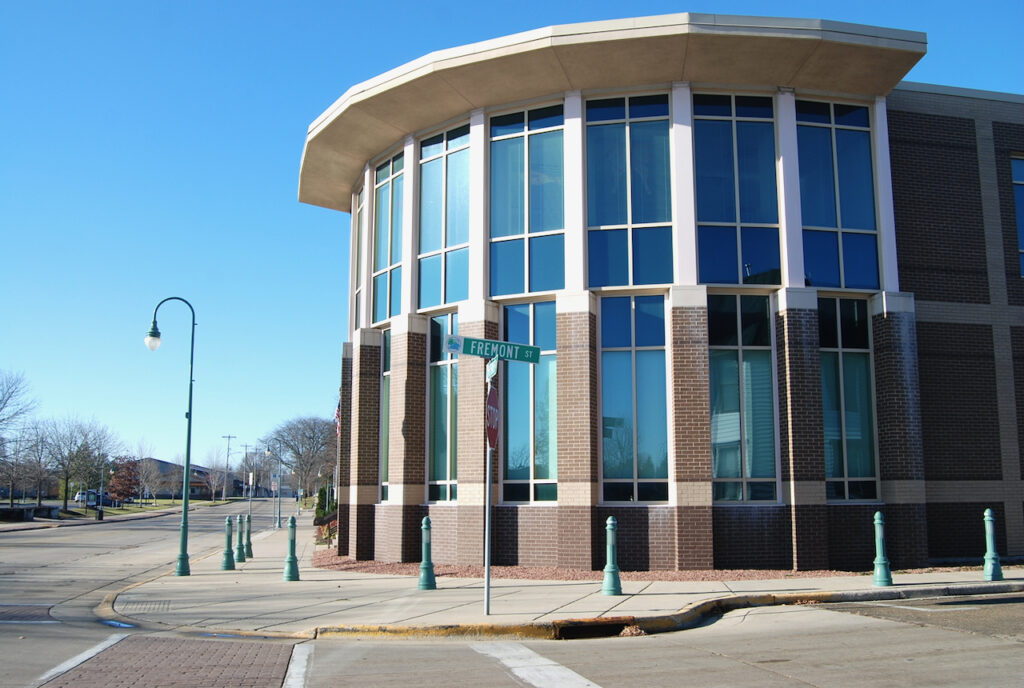City attorney finds no conflict of interest regarding library fund donations made by councilwomen Dawsey Smith, Brown
- Home
- City attorney finds no conflict of interest regarding library fund donations made by councilwomen Dawsey Smith, Brown

City attorney finds no conflict of interest regarding library fund donations made by councilwomen Dawsey Smith, Brown
By Kim McDarison
Whitewater City Manager John Weidl told members of the Whitewater Common Council Tuesday that the city’s attorney has determined that a conflict of interest is not present following donations made by two council members to the Irvin L. Young Memorial Library’s Capital Campaign initiative.
Some $2.3 million has been raised by members of the capital campaign committee to meet its fundraising obligations, which — when added to funds approved through resolution in 2021 to be provided by the city — will fund a $6 million library expansion. The building, after improvements, could open to the public in 2025, library officials have said.
An earlier story about the fundraising initiative is here: https://whitewaterwise.com/library-exceeds-capital-campaign-goal-to-fund-renovations-addition/.
Following concerns brought last month by Whitewater Common Councilwoman Jill Gerber that donations made by fellow council members to the Irvin L. Young Memorial Library’s capital campaign initiative could lead to a conflict of interest, Weidl, within his staff report presented during the council’s Tuesday meeting, noted that members of the city’s staff, including City Attorney Jonathan McDonell concluded that, when compared with the city’s “ethical guidelines,” a donation to the library’s fundraising committee by a council member “does not constitute a conflict of interest, nor would it preclude participation and/or action related to the city’s borrowing choices, including to support any Irvin L. Young Memorial Library expansion.”
As documented in the meeting packet, concerns about a potential conflict of interest were initially raised by Gerber, when, writing in an email to Weidl, she noted that council members Brienne Brown and Lisa Dawsey Smith had donated to the library’s capital campaign initiative. In her email, Gerber wrote that she was interested in understanding how the city’s attorney “weighs in,” further stating: “I believe this is also part of the Good Governance manual in term(s) of if they should abstain or both abstain/recuse from the vote or discussion.”
Brown, Gerber additionally pointed out in an email, serves on the library’s fundraising committee.
During Tuesday’s meeting, Weidl said he would keep his comments on the subject “brief,” pointing council members to a report from the city attorney which was included in their meeting packet. He noted that after McDonell analyzed the concern, he found that there were not conflicts of interest associated with the donations made by the two council members because, Weidl said, the Library Board and its capital campaign committee were both separate bodies operating autonomously from the common council. Additionally, he noted, council members making such donations did not stand to benefit from direct financial or personal gain.
Within an email to Weidl found within the meeting packet, McDonell wrote: “Because Library Board’s status aligns more closely with that of a ‘body politic’ rather than an ‘organization,’ and the board’s financial interest in the official action is limited, due to the fact that the city’s contribution has already been determined, I do not believe that a member of the council who is also a Library Board member and a member of the fundraising committee would have a conflict of interest in voting on the action which decides how the city would fund its already determined contribution amount.”
As earlier reported by WhitewaterWise, in December of 2021, the city approved a resolution making clear its commitment to fund $3 million of what was then described as a $5 million project. A contingency of the approval made the Library Board responsible for providing $2 million of the project’s cost.
As a matter of inflation, Library Director Stacey Lunsford in an update to the council, noting that project costs had risen to $6 million, making the Library Board responsible for funding half of the cost, then defined as $3 million.
Monies committed by the city council were, in 2021, anticipated to be included in the city’s 2024 budget.
In 2021, then-Whitewater Finance Director Steve Hatton noted that, among dollars earmarked for the project, $250,000 would come from within the city’s 2023 budget fund balance.
“I can see a bond issuance in 2024 for $3 million,” Hatton said.
As part of his staff report on Tuesday, citing McDonell’s analysis, Weidl said, “nobody has a conflict as identified by legal.”
Also on Tuesday, as part of a presentation of the proposed 2024-25 city budget, Finance Director Rachelle Blitch shared plans to include a borrowing to fund the city’s portion of the library project.
Information about the proposed budget and plans to follow through with a bond issuance in 2024 will be published in an upcoming story.
Potential for a walking quorum
In a memo to the council written earlier this month, referencing “explanation for sharing info on conflict of interest,” Weidl offered the following summary: “Two council members donated to the library’s capital campaign, along with 250-plus other community members, and one is a member of the Capital Campaign Leadership Committee — an ad-hoc committee created and authorized by the Library Board to raise funds through the capital campaign process. Further, the committee has no direct authority over the expenditure of funds raised and will disband when the campaign closes. As city manager, I was asked to look into this matter and seek the analysis of the city attorney, which is attached.
“After a comprehensive review with the city attorney, we’ve established that there’s no direct conflict of interest. The funding mechanisms are overseen by the Library Board and the city council, ensuring no financial or personal gain from either the donation or leadership committee participation. Simply, the criteria for determining a conflict of interest have not been satisfied under established legal standards.”
Within his memo, Weidl said he “recently shared an analysis,” which was included in the meeting packet, regarding potential conflicts of interest, which, he wrote, staff was asked to review by Gerber regarding the library expansion project.
Additionally, he wrote, Councilman Neil Hicks “asked a followup question … and then Council President (Jim) Allen then twice responded to the entire governing body with his opinion,” which, the memo noted, also was included in the meeting packet. The activity, Weidl wrote, “thus potentially created a walking quorum about a topic that is likely to come up at a future public meeting. In an effort to increase transparency, this memo is to release all of the relevant materials related to.”
Within his emails to Weidl, which also are included in the meeting packet, Allen wrote: “I don’t agree with your opinion. The terms for conflict of interest are clearly spelled out and not up to interpretation. If I had donated to the library fund, would your opinion be the same? I don’t think so.”
Allen asked Weidl why his responses about the matter, which he saw as between Weidl and Gerber, were addressed to the full council.
“I think sending your opinion to the entire council unfairly pressures Jon McDonell,” Allen wrote.
In response to Allen, Weidl wrote: “It is imperative to ensure transparency and allow for an open review of our actions, especially given your implication that my professional interpretation might be influenced by the parties involved. It is essential for the public to be informed when the integrity of a professional is questioned. Furthermore, since there’s a discrepancy between your understanding and that of the city manager and the city attorney, it’s crucial to maintain a transparent dialogue. This not only clarifies our positions but also safeguards against any potential retaliatory actions in the future against staff who are merely executing their duties as assigned and interpreting the ordinances as outlined by legal review.”
Within a memo to council, Weidl wrote that he believed it was “best if everyone sees the full analysis and supporting documentation to avoid any miscommunication or the spread of incorrect information.” He cited city staff as “not only professional, but also provides analysis of the concern that was brought forward.”
He described city staff and attorneys, whom he stated, “provided the analysis,” as “seasoned and knowledgable.”
“Without the staff, the city would not be able to champion half of the accomplishments that we completed in the past year,” Weidl wrote.
Respectful environment
Within his memo, Weidl concluded: “As city council, you have the ability to foster a respectful environment for the city manager and the rest of the staff. I understand that you as an elected official may have a differing opinion than the analysis provided, however, I ask that you at the very least treat staff with respect when they present the researched analysis to you. For it is the staff that dedicates their time, professional knowledge, and energy for the benefit of the city of Whitewater.”
In a memo provided in response to Gerber from Weidl on Oct. 30, referencing “clarification on potential conflict of interest concerns regarding library donations,” Weidl provided a “brief review of the situation and its alignment with (the city’s) ethical guidelines,” which outlined several criteria used to form the opinion. They included: authority separation, noting that the Library Board operates autonomously from the common council, maintaining its own governing jurisdiction; nature of donation: noting that the contribution to a broader community-wide cause, impacting many taxpayers — including outside Whitewater — and without direct personal gain, doesn’t create a conflict, especially in light of the common council’s overarching responsibility for citywide financial decisions; direct benefit: noting that for a true conflict of interest, the council member would need to gain uniquely or benefit as an individual significantly from the library’s expansion.
“Given the widespread list of donors and impact of tens of thousands of users per year, this doesn’t appear to be the situation,” Weidl wrote.
The review continued, offering as criteria: gifts versus donations, with the memo specifying that “the potential issue usually arises when officials accept gifts of value. In this case, the council member is making a donation to a capital campaign, which is an entirely different context”; decision influence, with the memo noting that “if the council member’s involvement in the fundraising campaign would skew their judgment, it might raise concerns. However, the donation construct has a separate capital campaign team and the separation of the Library Board’s sole jurisdiction of library matters, indicating no undue influence.”
Weidl wrote: “Deciding on recusal is often rooted in the specificities of an official’s role and ethical parameters. From the information at hand, there’s no evident conflict.”
A copy of the city’s 21-page “Good Governance Manual,” with a revision performed in 2018 and “minor updates” in 2020, was provided in the meeting packet.
A document titled: “Wisconsin’s Ethics Laws Recognizing and Avoiding Conflicts of Interest, 2023 Local Government 101” as published by the League of Wisconsin Municipalities, also was included in the meeting packet.

Whitewater Municipal Building, file photo/Kim McDarison.
This post has already been read 1560 times!
Kim
Our Advertisers
Most Read Posts
- No results available